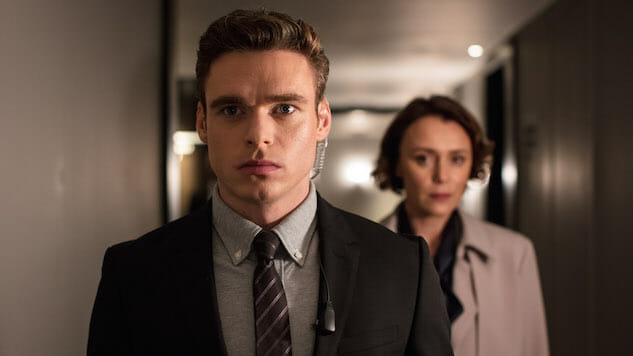At first glance, Bodyguard’s opening sequence is familiar enough: Square-jawed tough whirs into action on a London-bound train, desperate to stop a suicide bombing. Commuters evacuate the endangered cars. The perpetrator and the trigger-happy counterterrorism police come to a standoff, our hero holding the middle ground. But in Jed Mercurio’s exquisite actioner, which caused a sensation in Britain this summer, there are no rooftop chases, no ticking clocks, no fisticuffs with the villain’s henchmen. Instead, the six-part series finds suspense in watchful camerawork and careful pacing, as Metropolitan Police bodyguard David Budd (Game of Thrones’ Richard Madden) scans the platform for suspicious figures and spots a train employee on high alert. Twenty minutes pass, in often excruciating detail, before the cutaway to David’s home signals the crisis is over, and it’s this thorough control that makes Bodyguard worthy of your next TV obsession: It refuses shortcuts, rejects ellipses, until it approaches the effect of real time.
Rather than treat this as a gimmick, though, Mercurio, Madden, and directors Thomas Vincent and John Strickland use the technique to create potent echoes of the protagonist’s torturous vigilance, and indeed the nation’s. A veteran of the war in Afghanistan, David’s first assignment after thwarting the train attack is to protect Home Secretary Julia Montague (Keeley Hawes), a rising political star with her eye on 10 Downing Street—and a reputation as a national security hardliner. The result is an ingenious layering of form atop function, all within the context of a taut (if implausible) political thriller: Much of Bodyguard is comprised of tight close-ups of Madden’s anxious eyes following restaurant patrons and college conferees, in the name of protecting an advocate of expansive surveillance; much of the rest sees him on the edge of panic, breathing erratically and clenching his teeth, in the name of protecting a proponent of the conflict that caused his trauma in the first place. Bodyguard even implies that David himself might be a danger to Montague: In one remarkable sequence, we see David watching his charge defend her support for the wars in Afghanistan and Iraq on a newsroom monitor, which bleeds into the unnerving image of David rewinding the tape in his darkened apartment. Over and over and over again, until it’s almost painful, we hear her awful self-justification: “That doesn’t require apologizing for the past.”
Even when a nest of conspiracies threatens to let the air out of the proceedings—including the endless jockeying for position among the Metropolitan Police, led by Anne Sampson (Gina McKee); the intelligence services, led by Stephen Hunter-Dunn (Stuart Bowman); and the Home Office—Bodyguard returns to its foremost strength, this unflagging patience, to refocus our attention. There’s no rush to end negotiations, no insistence on swift detonations, no eagerness to blow through interrogations simply to move the narrative forward. In truth, Bodyguard is worth obsessing over because the series itself is obsessive, in the original sense of the term: Besieged, haunted, possessed, as if by an evil spirit. It’s this that David Budd, Julia Montague, the Metropolitan Police, MI-5, the news organizations, the British populace, and perhaps the entire “West” are clenched against. For all its thrills, shocks, and sudden twists, after all, Bodyguard is fundamentally a story of people desperate to protect freedoms they’ve long since destroyed, and though it ultimately complicates any easy political reading by tossing up a host of hurdles, scandals, turncoats, and cover-ups, the series reminds me less of 24 or House of Cards than of Homeland at its most momentous, stripped of all but its protagonist’s ability to see what others miss.
If there’s a lesson to be drawn from this—other than further proof that flashiness for its own sake is no substitute for methodical construction—it might be the one Montague raises when she startles David awake one night and his instinct is to attack her. “Whatever your training has made you,” she offers, as he shakes his head to himself and puts his fist to his lips. “It’s out of control.” Control and its absence are indeed central to Bodyguard as both aesthetic and subject matter; as the relationship between the bodyguard and the politician he’s sworn to protect grows increasingly fraught, and that relationship becomes embedded in the aforementioned nest of conspiracies, it seems as though the characters, even the series itself, might spin off their axes. To generate this sense of omnipresent peril, of being poised on the brink of disaster, is no small feat, though the series’ most impressive achievement is to connect the dots among its multiple forms of fear, attempts at control, applications of power. In the end, the War on Terror has not been defined by our ability to control the threat, but by the inevitability of losing it—and as Bodyguard reminds us, the ideals sacrificed in search of that control means we’re always losing something, even when the bomb doesn’t go off.
Bodyguard is now streaming on Netflix.
Matt Brennan is the TV editor of Paste Magazine
. He tweets about what he’s watching @thefilmgoer.